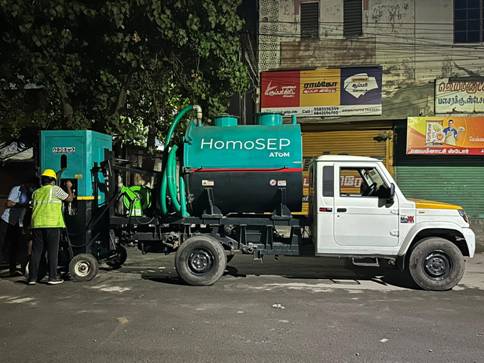India’s 1st septic tank cleaning robot strengthening Swatch Bharat campaign
India’s first septic tank/manhole cleaning robot, offering an end-to-end solution to eliminate manual scavenging, is strengthening the swachhata abhiyan in different corners of the country.
The technology called Homosep Atom developed by the startup incubated in the Department of Science and Technology (DST)-Technology Business Incubator (TBI) of IIT Madras, solves manual cleaning methods and transforms it to robotic cleaning methods. It has reached 16 cities in different parts of India and empowers extensive blade cleanings, solid waste desilting, suction and storage at one device; thereby reducing the cost of owning multiple assets and promotes robotic cleaning in sewers.
DST-Technology Business Incubators (TBIs) are established in Academic /Technical /R&D Institutions as part of NIDHI programme to support and nurture knowledge driven innovative start-ups into successful enterprises.
The startup called Solinas, which developed this affordable robotic solution integrated Artificial Intelligence (AI) to inspect, clean, and manage confined space for sanitation purposes. It helped clean up manhole blockages and reduced sewer overflows in Madurai. The application of Homosep Atom was also extended to the intricate lanes of Chennai’s densely populated areas. Targeting septic tanks associated with large apartments, housing boards, and individual houses, this process enabled Municipalities to promptly and efficiently clean, clear, and transport waste to treatment plants. Besides, sanitary workers were empowered with manhole cleaning robots that helped them clean the manholes from outside and avoid going inside the toxic environment, thus providing dignity to the sanitary workers.
Solinas is a deep-tech and climate tech startup born out of IIT Madras, founded with the intent to solve the challenges that revolutionizes the water and sanitation sector and improves the climatic conditions. The IIT Madras DST-TBI was also instrumental in advancing the product development of Solinas in the early stages.
The startup specialises in developing miniature robots, including India’s 1st 90mm water robot and 120mm sewer robot, capable of navigating through pipelines below 100mm to address contamination challenges in water-sewer pipelines. The exposure it received through support from DST ensured that the solutions were both sustainable and scalable.
Besides this flagship product, Solinas’s technologies solved some of the existing climatic challenges like water wastages, groundwater pollution, climate change and day-to-day human challenges like manual scavenging, drinking contaminated water, combined sewer overflows, etc.
Technologies like Endobot and Swasth AI served as pipeline diagnostic tools capable of detecting and mitigating water contamination, wastages, and sewer overflows, often unnoticed due to underground issues like leaks, blockages, and tree roots in cities like Coimbatore.
Solinas’s AI-based pipeline defect identification and assessment services helped save costs, reduce resolution time, and improve drinking water supply to the entire Hubbali city which provided drinking water supply to more than 1000 households. Identification of flaws in the sewage pipeline for The Sewerage and Infrastructural Development Corporation of Goa (SIDGCL), led to quicker and more cost-effective solutions. Partnering with Chennai metro it helped identify key challenges of cross-contamination and illegal tappings, thus improving pipeline integrity & water access.
“DST’s support for such startups is a major source of encouragement for youngsters who are inspired by the Government start-up movement to develop their knowledge-based enterprises and solve societal challenges as well as contribute to the growth and development of the country,” Professor Abhay Karandikar, Secretary DST pointed out.

